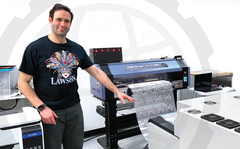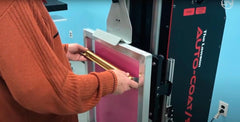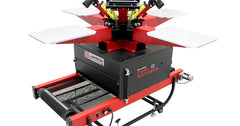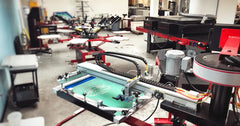A conveyor dryer is one of the most important things for your shop no matter whether you are a screen printer or do direct-to-garment (DTG) printing. There are several different things to consider when purchasing your first conveyor dryer or upgrading the current first. Here is a list of the top ten (10) questions to ask yourself when looking at a new (or used) conveyor dryer.
1. How much space do you have? There are a variety of different dryer options that come in different standard size options. Before you are able to choose what will work best for you, you’ll need to measure the space you have available. Think about your floor space in terms of width and length of your conveyor dryer. The longer the belt, the more shirts per hour it can dry. The most common dryer lengths are 8 feet, 12 feet and 16 feet long. Any reputable manufacturer can also add custom in- and out-feed to a dryer. Extending these helps perfect the dryer to your process. For example, extra long in-feed helps accommodate more printers and you can stage them around your dryer. Longer out-feed is useful if you do a lot of printing on polyester so the garments can cool before being stacked. This helps prevent ghosting. Similarly, the wider the belt, the more shirts can go through. This is because a wider belt can accommodate shirts side by side. Popular belt widths are 36 inches and 48 inches wide. Consider rearranging your floor plan to accommodate a larger conveyor dryer so you can maximize your space.
2. What type of ink are you drying? Are you a screen printer using plastisol ink, or do you use water-based and discharge inks? The two dry differently. Plastisol ink requires the ink to reach a certain temperature (typically 320 degrees or 280 for low-cure inks), whereas water-based inks dry by removing moisture. Even if you print plastisol, there is a chance are you will print on heat sensitive garments, like polyester or polypropylene bags. All of these require a conveyor dryer with air flow to dry properly. This means choosing a conveyor dryer with strong air flow.
DTG and pretreat solution drying require a conveyor dryer with a lot of air movement, as measured by CFM. Simply producing a lot of heat without a lot of air will scorch or burn a shirt.
3. What kind of electricity is in your building? Is it single-phase (also called 1-phase) or three-phase (3-phase)? Electric dryers require less money to purchase compared to gas dryers. Running a dryer on three-phase power draws less amps compared to 1-phase but is more expensive to install because the wire gauge (thickness) is bigger. Most buildings are set up for 1-Phase. Any quality screen printing dryer manufacturer should be able to offer the dryer in a 1-Phase or 3-Phase option.
4. How much sophistication do you want? Electric dryers that utilize true SCR electronic controls are the best conveyor dryers you can get. This is because an SCR controlled electric dryer regulates electric current flow for absolute temperature control in the most precise manner. Having an SCR controlled dryer means there is no “dead time” when heating panels are turning on and off, leading to reduced power consumption. Other garment dryers without SCR controls have heat fluctuations and spikes inside their heating chamber, a primary reason sensitive garments like polyester might scorch and burn products.
5. How do you want to control the dryer? The best t-shirt dryers are those that are WiFi enabled so you get the most control over the dryer and your production, no matter where you are. The latest technology allows you to visually monitor the status of the dryer, including chamber temperature, belt speed and the actual time garments are inside the chamber.
Do you want to be able to monitor your conveyor dryer’s operation and change dryer settings remotely from your I-phone, Android, I-pad or tablet? If so, a WiFi enabled control system is what you want. These systems also provide an ability to store dryer settings so you can easily switch between different belt and heat chamber settings if you print with different types of inks, like plastisol, water-based and direct-to-garment (DTG).
6. Is it cheaper to run gas versus electric where you are? Gas dryers can save you money if running gas is less expensive than electricity. Compare the rates you have from the gas company versus the electric company to see the savings. Keep in mind that gas dryers require a larger up front investment and typically more space. However, there are some small footprint gas dryer options, such as the Lawson Omega Gas Express screen printing dryer.
7. How many t-shirt printing presses are you going to be running? If you are currently running multiple manual machines, one or more automatics, or a combination of manuals and automatics, make sure the dryer you are looking at can keep up with production. Extending your infeed is one solution, allowing for enough room to lay shirts on both sides of the belt. Think about whether this dryer will keep up with your expansion plans.
8. What growth do you anticipate in the next 1-2 years? If you are expecting to see growth in the near future, such that you will need an equipment upgrade within a couple years, think about choosing a dryer with expansion capabilities. Options like the Lawson Blazer are able to expand. Another excellent option to consider is a manufacturer trade-in program, like Lawson’s Trade-In Trade-Up program.
9. What’s your budget? Consider your business’s financial shape in the immediate and the longer term. Cheap dryers are typically cheap for a reason, either through inferior parts or poor service. The only time you fret over price is when you write the check as a quality dryer will last you a lifetime.
10. What is your goal in garments per hour? If space, power requirements, price, and other factors allow, the smartest thing to do is pick out a dryer that has a little more space than you think you need. That way your dryer won’t bottleneck your production, and any time you get an unusual run, you won’t be resigned to wait around.
Using these top 10 questions when looking for a conveyor dryer will assist you in choosing the one that is the best fit for your business.







